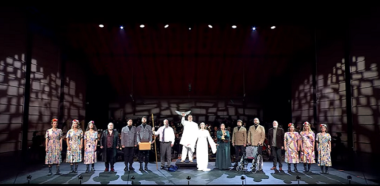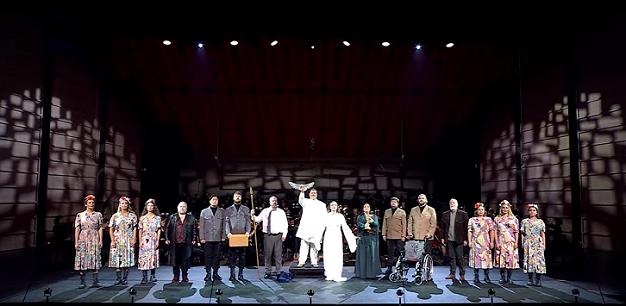 Norway Wagner, Parsifal (staged concert): Soloists, Bergen Philharmonic Choir, Edvard Grieg Kor, Edvard Grieg Jentekor, Edvard Grieg Guttekor, Collegium Musicums Choir (chorus master: Håkon Matti Skrede) and Bergen Philharmonic Orchestra / Edward Gardner (conductor). Livestreamed (directed by Marius Marthinussen Søreide) on Bergenphilive and OperaVision (and available until 21.5.2023) from the Grieg Hall, Bergen, 21.1.2023. (JPr)
Norway Wagner, Parsifal (staged concert): Soloists, Bergen Philharmonic Choir, Edvard Grieg Kor, Edvard Grieg Jentekor, Edvard Grieg Guttekor, Collegium Musicums Choir (chorus master: Håkon Matti Skrede) and Bergen Philharmonic Orchestra / Edward Gardner (conductor). Livestreamed (directed by Marius Marthinussen Søreide) on Bergenphilive and OperaVision (and available until 21.5.2023) from the Grieg Hall, Bergen, 21.1.2023. (JPr)

The more I write about concert performances of Parsifal (and I have seen and heard a few) there is little new I can write about Wagner’s final opera. What did the composer want us all to understand from his Parsifal? (Any further suggestions after reading this would be gratefully received.)
I remember a programme essay for a 2018 Saffron Opera Group performance when Speight Jenkins – Seattle Opera’s former general director – mentioned how Gurnemanz ‘tells the young man [Parsifal] that in the temple “time becomes space”. Even in the twenty-first century it is hard to understand what Wagner meant, he never said’. Thoughts on Parsifal veer from it being an eclectic mix of Christian symbolism, Buddhist philosophy and medieval myth, to being interpreted from a Freudian perspective, or even worse, considered to be a treatise on ‘racial cleansing’. Who is redeemed at the end of the work remains an intriguing puzzle as it could be almost any of the characters, especially if we accept it is all more Buddhist than Christian and they are all on the path from ignorance to enlightenment. Perhaps it is just that – towards the end of his life – it was Wagner himself who felt he should seek redemption?
I have repeated much of this because in the most stunning tableau of this ‘staged concert’ it showed how Parsifal brings solace and reconciliation to a fractured society riven by political, religious and (possibly) racial discord. Nicolai Riise – who directed what we saw on the concert platform with a light hand – has everyone (esquires, grail knights, flowermaidens, Klingsor, Kundry, the dead Titurel, Amfortas, and Gurnemanz) ‘healed’ under the dove of peace Parsifal holds aloft.

Basically, it is the sacred spear that pierced Christ’s side and the Grail with his blood that are the relics the plot hinges on: brotherhood, chastity and sexual desire links the wise and respected Gurnemanz, the wounded king Amfortas, his enemy Klingsor, a femme fatale Kundry, and the naive Parsifal, each of whom have their own demons to conquer. With Wagner in concert the audience can concentrate more fully on the words and music because they are spared the concern of being puzzled by the whims of the latest wunderkind stage director. To be honest with Wagner’s sublime music being performed in its entirety in Bergen for the first time in the opera’s 140 years, at times I would have been happier just to listen to it without some of the singing!
Ivar Skjørestad’s lighting suggested, where appropriate, the vegetation of a forest or the blue stained glass of the Grail Temple. Apart from a few chairs there was little on stage with only a table for Act I and a long red couch for Act II. Thankfully there was a hint of a dead swan stuffed in a sack, and for the grail ceremony there was a golden chalice which glowed blood-red and a salver of small goblets. Klingsor was actually given a spear (which oddly doesn’t always happen).
With singers – who commendably knew they roles – repeating performance they have probably given elsewhere there was only a minimal sense of stage direction and interaction between singers who sang out to the audience for most of the opera. There was an informal formality to what everyone wore though the grail knights seemed to be a militaristic order rather like modern Templars. There was a suggestion of army uniforms all with medal ribbon bars; the featured grail knights wore grey jackets and the esquires beige ones; Amfortas – if not in a grey dressing gown – was in a blue blazer; and the red-bereted, commander-in-chief Titurel was trundled on in a wheelchair for the first act and his empty chair, jacket and beret were venerated in the third one. The men of the chorus – in familiar black – represented all the other grail knights by parading across the stage before singing behind the orchestra and using their scores. I was listening through TV loudspeakers and the offstage women’s voices sounded as if they were in another city and oh the bells, I have heard clock tower bells with more resonance!
A modestly blinged up Klingsor had a (faux?) black leather coat; Kundry looked dowdy to begin with in green and matching crocheted shawl, later wearing a more fashionable red and black gown; and the flowermaidens were in gaudy floral print dresses and had flowery tiaras. In comparison, Brindley Sherratt seemed to have dressed himself as Gurnemanz with his brown corduroy jacket at the start and comfy grey cardigan when he returned in Act III. On this occasion the Voice from Above got her moment in the spotlight and looked angelic in white. Parsifal had a lumberjack shirt and grey padded gilet and a black hoodie was his ‘disguise’ in the third act before he returned at the end of opera in white.
Sadly, apart from Sherratt’s Gurnemanz, a number of noted Wagnerians were perhaps cast in the wrong roles. Sherratt was a grizzled and immensely authoritative Gurnemanz. The lower part of his bass voice is in fine shape but some of the higher lines of the music challenged him. Nevertheless, he communicated the text well and was the near-perfect embodiment of this Wagnerian elder. Johan Reuter did not seem particularly enfeebled, certainly not vocally, and his bitter, defeatist attitude was more like Alberich, or Wotan one of his signature roles. Ólafur Sigurdarson impressed as Alberich last summer in Bayreuth’s new Ring cycle and his rather forthright one-dimensional Klingsor, brought back memories of those performances as well as appearing to be an audition for Wotan. Reinhard Hagen’s deep bass impressed in Titurel’s baleful utterances, whilst Monika Jägerová’s Voice from Above sounded insecure and she distinctly failed to float her notes. Kudos to a playfully competitive sextet of onstage flowermaidens.
I would like to be enthusiastic about the contributions of Ricarda Merbeth as Kundry and Stuart Skelton (who I have watched over many years) as Parsifal. Merbeth was an overly melodramatic, wide-eyed Kundry who seemed to believe the opera was named after her character and she had the star part. (Whether that was her fault, or that of director Nicolai Riise, I cannot be certain.) Merbeth reminded me of Gloria Swanson in Sunset Boulevard at times and was the least alluring Kundry I have seen. Throughout Merbeth’s voice had the hard edge one associates more readily with Brünnhilde which she also sings.
Of the main cast this leaves me with Stuart Skelton’s effortful Parsifal portrayed – just like his Peter Grimes – as a sulky, immature boy in a man’s body and someone with a mental disability. He sang with little legato and zero radiance with a voice more suited to Tristan. Skelton’s ‘Nur eine Waffe taugt’ (‘But one weapon serves’) at the opera’s close – regardless of your personal belief system – really must be a summation of all that has gone before and underscore the transcendence of the final moments. Despite the substantial efforts of Edward Gardner, his committed choruses and the talented musicians of the Bergen Philharmonic Orchestra (Gardner is their chief conductor) the ending remained rather earthbound.
Gardner’s conducting of Parsifal had the Reginald Goodall-like expansiveness of a (similarly) great musician who knows every note of the score. There was plenty of ethereal atmosphere and, notably, sensitive support for his singers.
Jim Pritchard
Singers:
Stuart Skelton – Parsifal
Ricarda Merbeth – Kundry
Johan Reuter – Amfortas
Brindley Sherratt – Gurnemanz
Ólafur Sigurdarson – Klingsor
Reinhard Hagen – Titurel
Eirik Grøtvedt – First Grail Knight
Changdai Park – Second Grail Knight
Ingeborg Gillebo – First Esquire
Monika Jägerová – Second Esquire / Voice from Above
John Olsen – Third Esquire
Erlend Tvinnereim – Fourth Esquire
Agnieszka Adamczak – First Flowermaiden
Lydia Hoen Tjore – Second Flowermaiden
Olivera Tičević – Third Flowermaiden
Emily Pogorelc – Fourth Flowermaiden
Ingeborg Gillebo -Fifth Flowermaiden
Margrethe Fredheim – Sixth Flowermaiden
Concert staging:
Director and Stage concept, Casting advisor – Nicolai Riise
Lighting designer – Ivar Skjørestad
Costume designer – Cathrine Ahlsen
Assistant Conductor and Sound producer – Aage Richard Meyer
